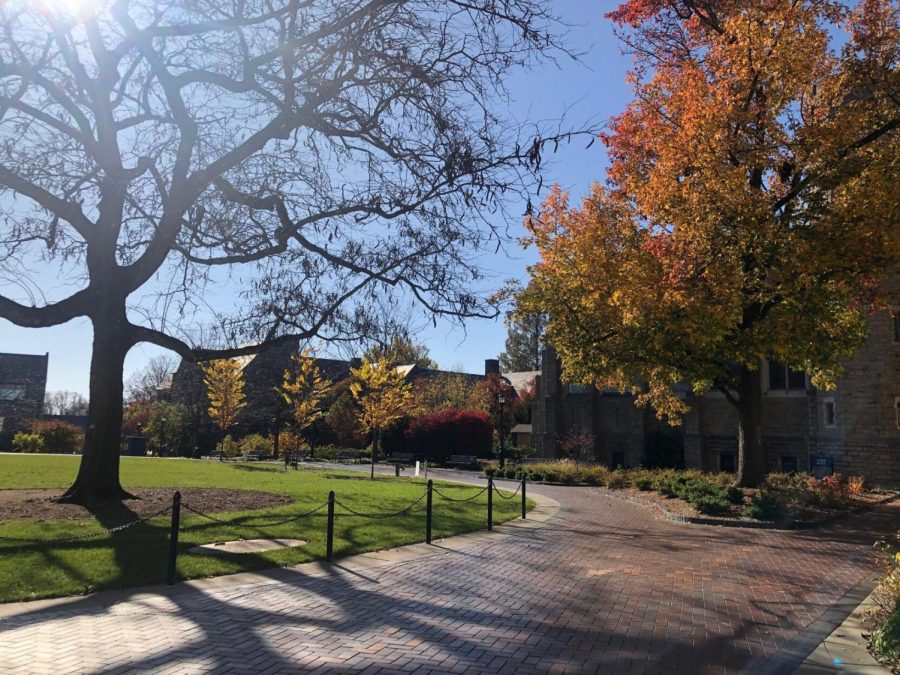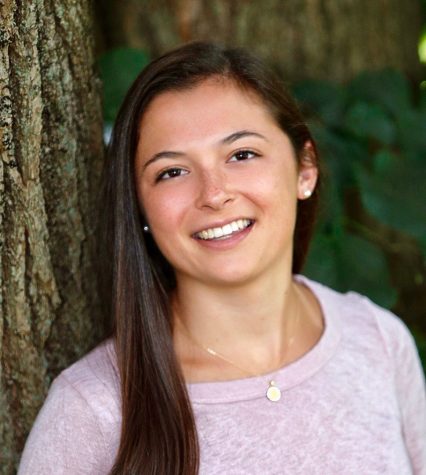University Sees Spike in COVID-19 Cases as the Semester Draws to a Close
The change in fall weather also brought a change in active COVID-19 cases to the community in the month of November.
November 18, 2020
After consistently reporting low numbers on the campus dashboard, the University saw a spike in cases over the past week. On Tuesday, Nov. 10, 21 new cases were reported, bringing the estimated campus total to 41 active cases. The trend continued for the next few days with a semester record high of 29 new cases reported on Wednesday, Nov. 11. The number of new cases has since decreased, with only 2 new cases reported that Friday.
With 101 estimated active cases and 70 students in on-campus isolation and quarantine as of Tuesday, Nov. 17, students are feeling the effects of this spike.
Last Thursday, Dean of Students Tom DeMarco announced that all extra-curricular, in-person programming events would be virtual for the next two weeks to help mitigate the spread of the virus. Several events, from the final Community First Wonder-Fall events to acapella rehearsals, had to be cancelled.
“Cases currently appear to be dispersed throughout the community and there is no evidence of a single super-spreader event leading to positive cases,” DeMarco wrote. “Most clusters of positive cases appear to be among groups of friends who interacted at social gatherings.”
Along with social gatherings off campus, there have been an increase in confirmed reports of students not wearing masks when gathering in classrooms and other spaces on campus. Additionally, not only did the increase in cases come from the undergraduate population, but there was some increase in cases among graduate students at the University as well.
J.J. Brown, Director of the Office of Student Involvement, contacted student organizations shortly after DeMarco’s email reached student’s inboxes.
“This is to promote a focus on academics and to keep things very low-key for these remaining days,” Brown wrote in regards to the cancellation of in-person, non-academic events. “I am asking that you use your influence and your leadership these last two weeks to remind everyone to recommit so we can finish the semester on campus and continue to prove that we can, in fact, have an on-campus collegiate experience.”
All athletic events were also cancelled for the rest of the semester. Only the men’s and women’s basketball teams, who are following an approved testing protocol, are able to continue practicing in anticipation of their respective seasons starting in November and December.
“We have been closely monitoring the recent increase in positive COVID cases on campus, and we are adjusting our athletics activities to support the campus plan to minimize large group gatherings,” Athletic Director Mark Jackson said. “There is not an outbreak of COVID cases in athletics, but like all areas of campus, we remain committed to doing our part to put Community First to ensure that our on-campus living and learning experience can continue. At this time, all athletic activities that take place outside of an approved testing protocol are suspended for the remainder of the semester.”
While the basketball teams continue to prepare in-person for their seasons, other teams will resume practice in January, for the time being.
The women’s rowing team has been one team in particular that has had to adjust to a wide range of circumstances since March.
“It is like a track athlete training on a treadmill for a 100 meter sprint race; it simply is not the same,” head coach Carissa Adams said. “That being said, I recently read an article that said the pandemic is teaching out athletes grit. As coaches and leaders, we must continue to compete for our teams but also zone in on the things that our teams are gaining by enduring the pandemic that will help us be competitive on the water…when we get back on.”
This has not been the first spike in COVID-19 cases at the University this fall. Occurring in late September, a spike forced the community to readjust and remember health and safety guidelines. Similar to the earlier spike, the University has been fully able to manage cases and remains well-equipped and well-resourced to do so for the remaining weeks.
Assistant Dean of Students Nick Tumolo saw this November spike as a combination of a variety of factors.
“It’s the end of the semester; the fatigue is at the greatest in terms of compliance,” he said. “The weather has frankly been gorgeous and that promotes just a lot of being out and about. The election happened, so there was a lot happening around that. Halloween, which was now three weekends ago, had higher activity. So, I think it was a combination of all of those things.”
Tumolo also pointed to the current nationwide spike in cases in relation to the one seen on campus.
“We have to remember that Villanova is a microcosm of society, of the local area and larger community,” he said. “Cases are rising everywhere, and in many ways, we are a reflection of that.”
The administration does not have data to tie the spike to any particular group or particular event, as reiterated by DeMarco and Tumolo.
“This is just me speaking as a Villanovan, but it is presumably a totality of the circumstances of the past couple weeks, Tumolo said. “I feel like everyone was asking for the why, and I do not have any data to support this, but just annectodely, and I think I have a good pulse on the student body, over the past couple of weeks there has been a lot going on.”
Recalling the spike that occurred in September, Tumolo noted nearly four or five days of higher cases. Cases that month suddenly rose, plateaued for a few days, then decreased to numbers the community was used to seeing each day.
“If we look at that as precedent in September, I am hoping that we’re plateauing, and then we will start to go back down,” Tumolo added. “I was worried our numbers were going to double.”
On Tuesday, Nov.17, only five positive cases were reported on the University’s dashboard, a stark difference from the 29 cases seen on the Wednesday prior.
“I’m hoping that we use this as an opportunity to remember that things are still fragile,” Tumolo said. “Be that encouragement. Be that reminder that we have made it for 15 weeks, and we can make it for 10 more days if we do what we need to do.”
Despite cases starting to plateau this week, some students have returned home earlier than expected in order to mitigate the spread on campus and lessen the risk of returning home infected with the virus.



